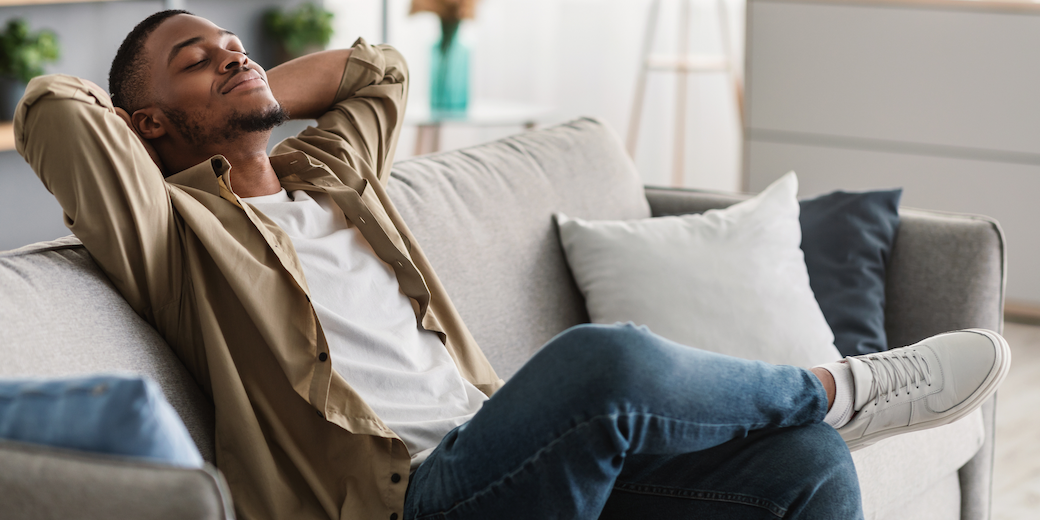When life gets busy or stressful, it’s important to remember to take a moment and relax. For many, that might seem easier said than done. Relaxation doesn’t actually come easy to many of us. With technology, social media, and fast-paced lives, it’s hard to unplug and just relax. Have you ever noticed that it can take a few days to learn to unwind while you are on the vacation? Learning to relax is actually a learned skill, similar to meditation or mindfulness.
Table of Contents
Believe it or not, though, there are several techniques to help you relax. Here, we will help you learn why it’s important to learn how to relax (and the major benefits), then show you a few techniques that you can use.
Why Relaxation Techniques Are So Important
It’s no surprise that in today’s society, many people are leading high-stress lives. Carrying around stress in your body affects both your mental and physical health in many ways. When something triggers a stress signal in your body, large amounts of hormones are released, two of which are cortisol and adrenaline.
Cortisol is the main stress hormone and affects your health in various ways. During stressful situations, cortisol changes the way your immune system responds, as well as the way your digestive and reproductive systems work. Unfortunately, long-term exposure to cortisol and other stress hormones can wreak havoc on your body.
Some physical and mental symptoms that you may experience include:
- Changes in mood, like anxiety and depression;
- Muscle tension;
- Headaches;
- Weight gain or loss;
- Digestive issues;
- Trouble sleeping;
- Memory problems;
- Heart disease, high blood pressure, and a higher risk of a heart attack.
Because of this, it’s crucial to find ways to relax and let go of stress. If you have physical symptoms of stress, you’ll find that even taking a few minutes to relax can have a positive effect.
Benefits of Relaxing
When you start to feel the symptoms of stress, taking a break (even for just a few minutes) can work wonders. When you’re stressed, you’ll probably notice that you’re more irritable, overwhelmed, or that you just don’t feel like yourself.
While it’s impossible to avoid stress, it’s entirely possible to learn how to manage it. All it takes is learning a few techniques that you can use in a pinch when everything starts to feel like too much.
You will find that, just as stress has negative effects on your body, relaxing has several positive effects. As you relax and calm down, your blood flow increases around your body. This gives you a boost of energy, which leads to a clearer mind and a calmer overall outlook. When your mind is clear, you’re better prepared for making decisions and concentrating on the task at hand. It’s also easier to think in more positive ways and evaluate situations rationally.
As you unwind, your heart rate slows down, which causes your muscles to relax and relieve tension. Your blood pressure lowers, and your digestion returns to normal. This is important, since you may notice that you have a little appetite when you’re stressed or that you deal with stress by overeating. Healthy digestion allows your body to properly absorb the nutrients that it needs to stay healthy and fight off disease and infections.
Learning to relax at the moment is very helpful. Practicing relaxation techniques has many other positive effects. For example, your quality of sleep might get better. You may notice improved sleep patterns and a decrease in insomnia or restlessness. If you have chronic pain, you may also notice that it gets better when you’re relaxed. Being relaxed can give you a sense of calm and confidence that can help you better cope with the world around you.
Relaxation Techniques
So, now that you know all of the ways that relaxing can benefit your mind and body, how do you actually do it? Let’s take a look at some relaxation techniques that you can incorporate into your life to relieve stress and improve balance.
1. Deep Breathing
As simple as it sounds, one of the easiest ways to manage stress is by concentrating on your breathing. This technique is especially useful since it can be done at any time, any place.
Taking deep breaths can help you relax during moments of stress, but practicing breathing techniques as part of your daily routine can give you the most benefits. In just a few minutes, you’ll start to notice that your feelings of stress and anxiety will start to subside.
Even though breathing is a natural function, chances are good that you probably don’t give it much thought. By practicing breathing techniques, you’ll soon discover that it’s one of your body’s natural medicines.
Pausing for a few minutes to perform breathing exercises can lower your stress and give you a sense of calm. There are several controlled breathing exercises that you can try, including abdominal breathing, alternate-nostril breathing, and breathing in through your nose and out through your mouth. Each technique puts the focus on your breath and lets your mind relax.
Want to learn more about breathing exercises? Check out our article 'Breathing exercises to reduce stress'.
2. Meditation
Breathing exercises go hand-in-hand with meditation. Research shows that people who practice daily meditation can re-train the way their brains deal with anxiety and stressful situations. This tool opens up your mind and trains it to be less reactive to stressful stimuli. Meditation helps your brain to deal with stress in a different way so that you can look at the triggers and relate to them in a different way.
Breathing and meditation help you to notice the way in which you react to stressors, along with specific mental patterns. By identifying these patterns and reactions, you can better control them and the way you are affected by them.
Meditating is one of the best things you can do to calm your mind in a short amount of time. Meditation can be done just about anywhere, so whenever you begin to feel stressed and have a moment to pause, you can use this tool.
Want an in-depth overview of meditation, check out our article 'What is Meditation'.
To get started, sit in a relaxed position, making sure that your spine is straight. This lets your lungs open up so that you can take nice, deep breaths. Tuck in your chin and relax your facial muscles.
Plant your feet on the ground if you’re standing or sitting in a chair.
Take deep, comfortable breaths, and let your body fall into a natural rhythm. Try holding each breath for 5 seconds, then repeat again. When you notice that your mind starts to wander, acknowledge it and then go back to focusing on your breathing.
Want to learn more about how to meditate? Check out our article 'How to Meditate'.
3. Moving Meditation: Tai Chi, Qigong, and Yoga
Moving purposefully is a proven way to relieve stress and negative emotions. Paired with breathing, ancient practices like tai chi, yoga, and qigong can help relieve tension and quiet your mind. Developed thousands of years ago, these techniques were created for different purposes.
Tai chi was a Chinese self-defense technique that is now a type of gentle workout to improve health. Even though there are several styles of tai chi, they are all based on low-impact, slow movements. Your body is continuously moving in careful poses while you concentrate on deep breathing. The aim of this practice is to focus just on your breath and movement and to push away other distracting thoughts.
Qigong is another ancient Chinese practice that pairs movement with intentional breathing. A meditative movement practice, it’s scientifically proven to be an effective way to deal with the physical symptoms of stress. Many clinical settings in modern medicine use qigong as a way to promote physical and mental health.
Yoga is the most well-known of these practices and has become very popular over the years. There are several different styles that vary in intensity, and some have different purposes. Most people who regularly practice yoga notice an increase in flexibility, stamina, and strength, as well as a feeling of balance and calm.
4. Acupressure
Another traditional technique that comes from the East is acupressure. This is a type of massage that puts pressure on specific points of the body to relieve stress and anxiety. These points are ones that increase blood flow and help the muscles to relax. Acupressure can be performed anywhere once you know about the correct pressure points.
A great way to relax in just a few minutes wherever you are is a scalp massage. Experts believe that scalp massages increase blood flow while decreasing blood pressure. They also help to eliminate the physical effects of stress, like tension headaches. These headaches cause pain in your head and neck, including behind your eyes. A quick scalp massage can reduce the intensity and length of your headache while providing your mind and body with a nice, relaxing effect.
5. Massage
There’s nothing quite like getting a massage when you’re stressed. Studies show that just 10 minutes of massaging with moderate pressure relieve a significant amount of stress. Like acupressure, massaging works by stimulating and applying pressure to specific points of the body to release tension and stress.
If you find yourself becoming anxious, try giving yourself a quick hand massage or pressing your fingers into a pressure point on your hand. One such point is the webbing between your thumb and pointer finger. Using the pointer finger and thumb of one hand, press down on this pressure point on the opposite hand. Massage this point for up to five seconds, all while taking slow, intentional breaths.
Practical Ways to Relax in 5 Minutes or Less
If you're short on time, here are some proven ways to relieve stress and relax in just a few minutes.
1. Visualize What You Want
Try visualizing what you want and need at this moment. Go to your happy place. Close your eyes and think of something that makes you happy: a place, a feeling, or anything else. Calmly think about all of the details and focus on each one. The deeper you go into your visualization, the more relaxed you’ll begin to feel. This technique works best if you can find a calm, quiet place to slip away to so that you can really focus on your visualization.
2. Get Some Sun
Natural sunlight can provide you with a quick dose of calm. Connecting with nature, even for a few minutes, can help your mind to relax and regain balance. If you can’t get outside, position yourself near a window where you can soak up some rays and vitamin D.
3. Go for a Walk
A quick walk gives you time to move your body and connect with nature. Even if it is just for a few minutes, going for a walk can help you clear your mind or even practice breathing. Studies show that simply looking at or being in nature is a way to reduce stress.
4. Write it Down
Putting your feelings to paper can be a great way to unburden and unload. Journaling about what’s worrying you gives you the opportunity to release your worries and then look back and reflect on them. Looking at the problems in front of you might help you see them in a new way and learn how you want to deal with them.
5. Listen to Music
Listening to your favorite music is a proven way to release stress. If you’re at home, crank it up and sing and dance along to let your stress out. If you’re in a public spot, pop in your earbuds and turn on your favorite playlist. Letting yourself get lost in the music gives you the chance to relax while giving you a hit of happiness.
6. Aromatherapy
If you’ve never tried it before, aromatherapy is a relaxing tool to deal with stress and anxiety. This practice uses essential oils: aromatic oils derived from plants, including their roots, flowers, and leaves. They are used in aromatherapy to improve health and well-being.
While research is ongoing, aromatherapy is believed to relieve stress and anxiety through smell receptors in your nose. These receptors send signals to your nervous system to help you relax. It’s also thought that essential oils can have an effect on your body’s natural chemical and energy systems. Essential oils are usually inhaled or applied topically during aromatherapy.
Make It a Routine
Now that you have some techniques under your belt, it’s time to put them into practice. Regularly practicing these skills will help change the way you think and feel by allowing you to see things in a calm, clear manner. If you need some guidance, visit SofiaHealth for professional wellness advice.
What are you waiting for? It’s time to find your zen.
Learn more about meditation
|
|
|








